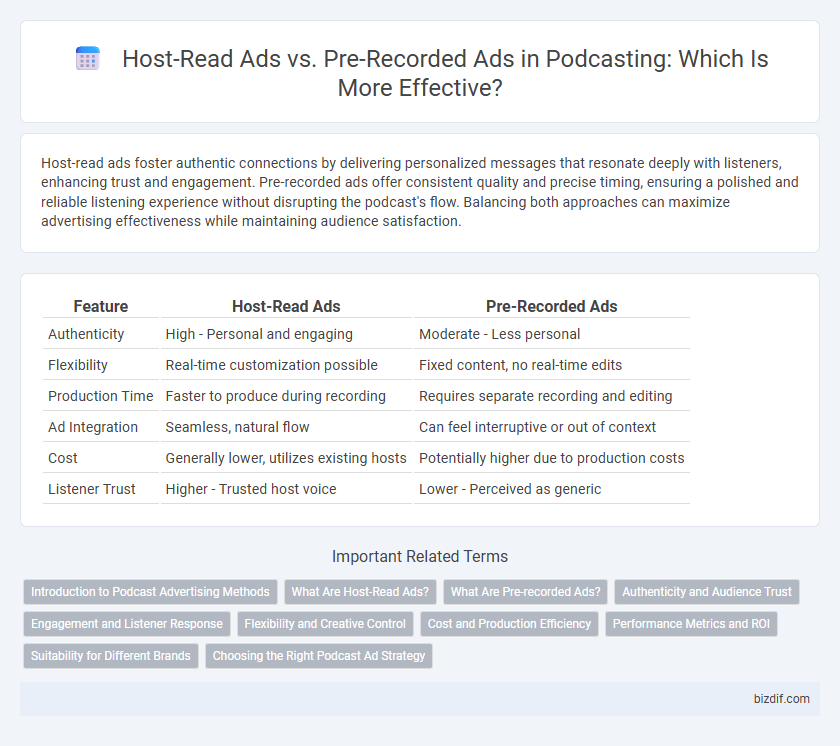Host-read ads foster authentic connections by delivering personalized messages that resonate deeply with listeners, enhancing trust and engagement. Pre-recorded ads offer consistent quality and precise timing, ensuring a polished and reliable listening experience without disrupting the podcast's flow. Balancing both approaches can maximize advertising effectiveness while maintaining audience satisfaction.
Table of Comparison
| Feature | Host-Read Ads | Pre-Recorded Ads |
|---|---|---|
| Authenticity | High - Personal and engaging | Moderate - Less personal |
| Flexibility | Real-time customization possible | Fixed content, no real-time edits |
| Production Time | Faster to produce during recording | Requires separate recording and editing |
| Ad Integration | Seamless, natural flow | Can feel interruptive or out of context |
| Cost | Generally lower, utilizes existing hosts | Potentially higher due to production costs |
| Listener Trust | Higher - Trusted host voice | Lower - Perceived as generic |
Introduction to Podcast Advertising Methods
Host-read ads offer a personalized and authentic connection between the podcast creator and the audience, often resulting in higher listener engagement and trust. Pre-recorded ads provide consistent audio quality and ease of integration across multiple episodes or platforms, ensuring brand messaging remains uniform. Both methods play crucial roles in podcast advertising strategies, with host-read ads enhancing relatability and pre-recorded ads optimizing production efficiency.
What Are Host-Read Ads?
Host-read ads are advertisements delivered live by the podcast host during the episode, creating a natural and authentic connection with listeners. These ads often feel more personal and trustworthy because the host can tailor the message to fit the podcast's tone and audience. Host-read ads typically result in higher engagement and better listener retention compared to pre-recorded ads.
What Are Pre-recorded Ads?
Pre-recorded ads in podcasting are audio advertisements that are created, edited, and finalized before the episode is released, ensuring consistent sound quality and precise timing. These ads allow advertisers to maintain control over the message and brand voice, independent of the host's style or delivery. By using pre-recorded ads, podcasters can streamline production while providing listeners with clear, professionally produced sponsorship content.
Authenticity and Audience Trust
Host-read ads generate higher authenticity and stronger audience trust due to the personalized delivery by podcast hosts. Listeners perceive these ads as genuine endorsements, increasing engagement and conversion rates compared to pre-recorded ads. Pre-recorded ads may lack emotional connection, resulting in lower trust and effectiveness in influencing audience behavior.
Engagement and Listener Response
Host-read ads generate higher engagement and stronger listener response compared to pre-recorded ads due to their authentic and personalized delivery. Listeners tend to trust host-read ads more, leading to increased brand recall and conversion rates. Pre-recorded ads often lack the emotional connection and spontaneity that drive active listener interaction and responsiveness.
Flexibility and Creative Control
Host-read ads offer greater flexibility and creative control, allowing podcasters to tailor messages in real-time to match their tone and audience preferences, resulting in more authentic and engaging promotions. Pre-recorded ads, while consistent and polished, limit adaptability and may feel less personal, potentially reducing listener engagement. The ability to customize host-read scripts on the fly enhances relevance and effectiveness, making them a preferred choice for advertisers seeking dynamic content.
Cost and Production Efficiency
Host-read ads typically offer higher engagement and authenticity but involve greater time investment and cost due to live recording and host involvement. Pre-recorded ads reduce production expenses and streamline scheduling, enabling scalable ad placements without disrupting podcast flow. Balancing cost-efficiency with listener trust is crucial for maximizing ad revenue in podcast monetization strategies.
Performance Metrics and ROI
Host-read ads in podcasting consistently deliver higher listener engagement and improved recall rates compared to pre-recorded ads, resulting in significantly better click-through and conversion metrics. The authentic, conversational tone of host-read ads fosters trust and brand affinity, directly enhancing ROI by driving more targeted actions from a loyal audience. Pre-recorded ads, while easier to scale, often see diminished effectiveness due to lower perceived authenticity, negatively impacting overall campaign performance and return on investment.
Suitability for Different Brands
Host-read ads offer a personalized touch that enhances brand trust and engagement, making them ideal for brands seeking authentic connections with niche audiences. Pre-recorded ads deliver consistent messaging at scale, suitable for brands aiming for broad reach and precise control over content. Brands targeting local or specialized markets benefit more from host-read ads, while national campaigns often prefer pre-recorded ads for uniform brand representation.
Choosing the Right Podcast Ad Strategy
Host-read ads offer authentic engagement by leveraging the podcast host's trusted voice, enhancing listener connection and ad recall. Pre-recorded ads provide consistency and ease of integration across multiple episodes and shows, ensuring brand messaging remains uniform. Selecting the ideal podcast ad strategy depends on factors such as target audience alignment, campaign goals, budget, and the desired balance between authenticity and scalability.
Host-read ads vs Pre-recorded ads Infographic

 bizdif.com
bizdif.com